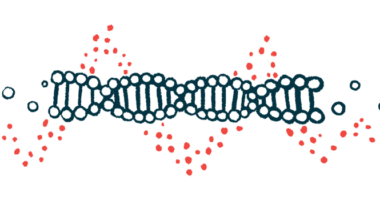Tegsedi Approved in US for Treatment of FAP in Adults

The U.S. Food and Drug Administration has granted approval to Tegsedi (inotersen), by Akcea Therapeutics and Ionis Pharmaceuticals, for the treatment of adults with hereditary transthyretin-mediated amyloidosis (hATTR), also called familial amyloid polyneuropathy (FAP).
Along with approval in the U.S., Tegsedi was also approved in Canada this month and in the European Union in July.
hATTR amyloidosis is caused a mutation in the TTR gene, which leads to the formation of an irregular transthyretin (TTR) protein. Patients with hATTR develop deposits of mutated TTR protein in several tissues and organs.
As these deposits accumulate, patients develop sensory, motor, and autonomic (involuntary processes such as breathing) dysfunction, which can negatively affect numerous facets of their lives.
Tegsedi, a once-a-week subcutaneous (under the skin) injection, was designed to decrease the production of the mutated TTR protein.
“TEGSEDI is the first and only RNA-targeting therapeutic that powerfully reduces the production of TTR protein through a once-weekly subcutaneous injection offering patients an effective treatment for people living with polyneuropathy caused by hATTR amyloidosis,” Paula Soteropoulos, CEO of Akcea Therapeutics, said in a press release. “We believe this profile will make TEGSEDI an excellent choice for many patients and that it’s self-administration gives the flexibility to treat at a time that works for them which could change the way this progressive and debilitating disease is treated and managed.”
“As we execute on our multi-country launch, we are committed to delivering a comprehensive treatment experience for people taking TEGSEDI. Beyond the drug itself, this includes ensuring patients who need this therapy have access to it, offering personalized support programs and enabling patients to administer treatment on their own terms,” Soteropoulos added.
Approval was based on positive results from the Phase 3 NEURO-TTR clinical trial (NCT01737398), which set out to assess the effect of Tegsedi on two primary objectives — quality of life (measured through the Norfolk Quality of Life Questionnaire-Diabetic Neuropathy score, or Norfolk QOL-DN) and neuropathic disease progression (measured by the modified Neuropathy Impairment Score +7, or mNIS+7).
Researchers recruited hATTR amyloidosis patients with symptoms of polyneuropathy, who were then randomized in a 2:1 ratio to receive either Tegsedi or a placebo.
Results indicated that Tegsedi-treated patients experienced substantial improvement in both primary objectives compared with patients on a placebo.
Additionally, results indicated that Tegsedi treatment reduced levels of serum TTR protein (circulating in the blood) by an average of 79%, regardless of the type of TTR mutation, gender, age, or race.
Results were published in a study, titled “Inotersen Treatment for Patients with Hereditary Transthyretin Amyloidosis,” in the New England Journal of Medicine.
“TEGSEDI has demonstrated a nearly 80% reduction in TTR, which is now a validated approach to treating this disease. The rapid and sustained improvements compared to placebo and reversal in measures of disease seen in a substantial proportion of patients coupled with the independence offered through self injection provide a sense of hope not only to patients, but to their caregivers and families as well,” said Morie Gertz, MD, hematologist and Chair Emeritus of Internal Medicine at the Mayo Clinic.
Use of Tegsedi has been known to cause thrombocytopenia (low platelet levels) and glomerulonephritis (inflammation of the kidney). Therefore, patients are required to undergo increased monitoring for early detection and management of these risks.
Tegsedi is being sold under the Risk Evaluation and Mitigation Strategy, which is a drug safety program the FDA requires for certain medications with serious safety concerns to ensure the benefits of the therapy outweigh its risks.
To help FAP patients gain access to Tegsedi, Akcea has launched Akcea Connect, a support program composed of regionally based nurse case managers who are knowledgeable about and have experience with the medication.
Akcea Connect offers free, private, and personalized support to patients, caregivers, and families around the U.S. The program is now in the process of accepting patient enrollment forms.
“We understand that managing a rare disease goes beyond providing a new medicine and our highly skilled team is fully prepared to provide an effective, safe and comprehensive treatment experience. Our industry-leading patient support program, Akcea Connect, is poised to help patients through every stage of their TEGSEDI treatment journey, and we are well advanced in discussions with leading payers to facilitate access. We are excited and ready to execute on our launch plans and bring TEGSEDI to patients,” said Sarah Boyce, president of Akcea.






